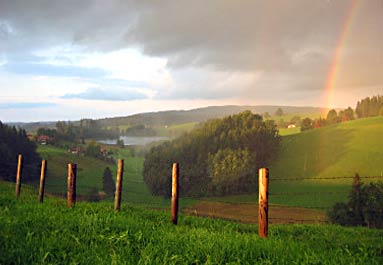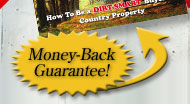This original column is provided free for one-time use with author credit at the end. It may be used for background with author credit. Copyright applies.
#29 FOR IMMEDIATE RELEASE: March 27, 2008
A dump is a terrible thing to waste
By Curtis Seltzer
BLUE GRASS, Va.—One of the great sorrows of modern country life is the loss of the county dump.
I remember when dumps were real dumps.
On Saturday mornings, you’d throw your junk in the back of a spring-shot pick-up truck that you kept running for such occasions. This was not just any worn out ghost boat from Detroit. This truck had personal meaning. (I won’t go into all the possible meanings of “meaning.”) But time and rust had marched on. Drat.
The county dump was out of sight but never far from everyone’s thoughts.
Dumps were one of the most civil places around. All visitors were equal—doing the same thing in the same way for the same reason. The richest citizen was indistinguishable from the poorest.
Curiosity about each other’s trash bred friendliness. Men talked with one foot up on a rear bumper, elbows resting on the tailgate. Women chatted; children explored. You’d volunteer to help a familiar face drag off an old stove, and introduce yourself in the process.
The dump was a libertarian place. People policed themselves, making sure not to leave nails on the dirt roads that could puncture the tires of others.
Segregation was unknown. The footless chair lay with the armless phonograph and the headless doll babies. Ripped up flooring, chipped canning jars, tubs with possibly pluggable leaks, the unwanted, the broken, the worn—everything was tossed together in small peaceable kingdoms that never squabbled with each other over who owned what land or what belonged where.
The old dump was big and good.
It was there that imagination lifted. Scrap wood could be salvaged and turned into a bookcase. That old pickle barrel, if you cut it right and put in a plywood seat, it made an outdoor chair.
Often, you’d haul home about half of what you threw out, but different. This wasn’t called recycling, but it was. People in the country always have a use for good junk; it’s only a matter of when.
Problems existed, of course. Water was contaminated by harmful liquids. Fires started. Rats grew fat. The place smelled. It didn’t look like a golf course.
For those reasons, we no longer have free-range dumps. Today, we have recycling centers and sanitary landfills.
Today, separation rules. Green glass in this bin; brown glass in that. Aluminum here, galvanized there. Organization, hierarchy, penalties. People do their business and leave. Men wear outfitter clothing and safari hats. Women wear their war paint.
While everyone understands the conservation logic behind the change, I grieve over lost opportunities.
Thrown-out stuff can’t be salvaged, taken home and made useful. Things can’t be converted from what they were to something else, entirely different. Sculptures no longer rise from the backyard welder and his pile of dump junk.
As our dumps have vanished, we, as a people, have lost some of our handiness and ingenuity.
Wilbur and Orville could no longer fashion a propeller for heavier-than-air flight out of da Vinci’s idea for a “helical screw” and a discarded barn beam.
The village smithy no longer cobbles together something out of old nothings under the spreading chestnut tree. Smithies and chestnuts, both gone.
So here is a modest proposal to improve rural America.
Each modern disposal center could set aside a couple of acres for a still-maybe-useful-solid-junk exchange. Donors would decide for themselves what qualifies. Takers could wander and be as picky as they want. If something doesn’t move off the lot within six months, into the bin with it.
The solid-junk exchange would rebuild communities. Friendliness and thoughtfulness would increase. The marketplace of ideas would be expanded and expression encouraged.
Jefferson would smile.
Waste is a terrible thing to waste.
Curtis Seltzer, land consultant, is the author of How To Be A DIRT-SMART Buyer of Country Property at www.curtis-seltzer.com. He holds a Class A residential contractor’s license in Virginia and has lived in a now 90-year-old farmhouse for 25 years.
Contact: Curtis Seltzer, Ph.D.
Land Consultant
1467 Wimer Mountain Road
Blue Grass, VA 24413-2307
540-474-3297
curtisseltzer@htcnet.org
www.curtis-seltzer.com
This original column is provided free for one-time use with author credit at the end. It may be used for background with author credit. Copyright applies.
|









